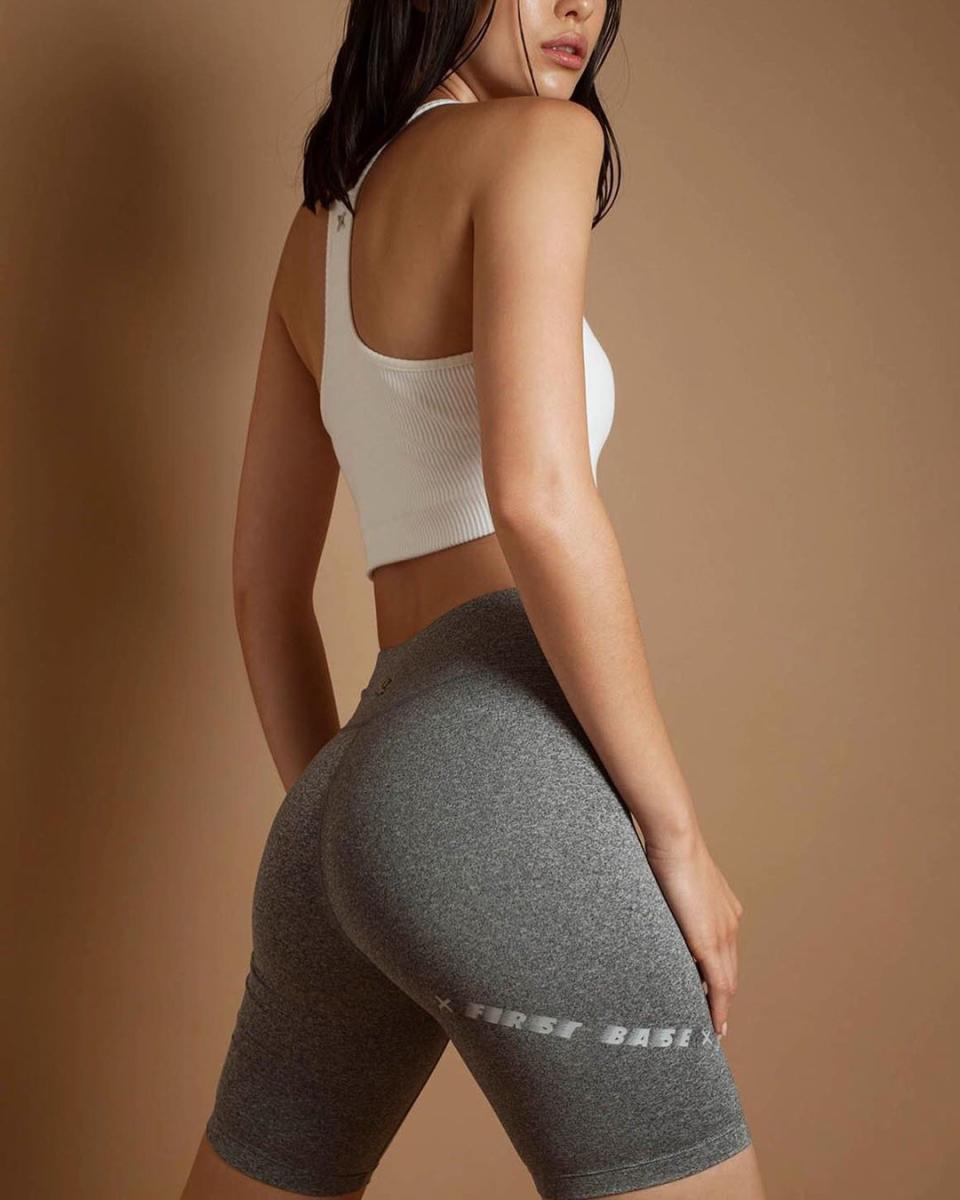'Sustainability is sexy': Aussie activewear brand's eco mission
If the first thing that pops into your head when you think ‘eco-friendly fashion’ is a shapeless, sack-like garment made of brown hemp then, well, once upon a time you’d probably be right.
These days, however, there’s an ever-growing array of modern clothing brands that are turning the old ‘hippies and hemp’ stereotype on its head by producing sustainable fashion that’s downright sexy.

Aussie activewear label First Base is one such example. Founded by Bondi-based designer Alison Cotton in 2013, First Base has been making ethical yet edgy crop tops, leggings and more since introducing environmentally-aware practices five years ago.
Alison tells Yahoo Lifestyle that it was an aha moment during a ‘magical’ team getaway to beautiful Byron Bay that set the business on a more sustainable path.
“I took my staff to Byron for a surf trip/Christmas party a number of years ago and on one of the days we surfed Tallows [beach] and it was just magical,” she recalls.
RELATED:
Great Barrier Reef and more Aussie destinations 'under threat'
'So wrong': Charity bin photo leaves locals fuming in Queensland

“We were all in awe and it was a turning point to realise how lucky we were to enjoy this pristine environment.
“It prompted me to ask myself questions about how we were doing things and how we could do them better. So we made a pact to do better, a lot better, and we just started bit by bit, changing the way we were doing things and refusing to compromise.”
Sexy yet sustainable
Alison and her team began to rethink what sustainability could look like for a fashion-forward brand and its consumers, and how they could translate those values into First Base’s design ethos.
To dispel the ‘brown hemp sacks’ stigma, she started sourcing and producing modern sustainable fabrications that could be incorporated into the brand’s youth-orientated colours and designs.
In the five years since Alison is proud to report that the brand continues to dig deeper and refine its practices.
“We’ve not only totally reimagined how we produce but also stopped producing as much and have started repurposing and restyling existing end of life garments to stop them ending up in landfill,” she explains.

But it hasn’t been an easy road. Alison admits that when she first floated the idea of openly embracing the brand’s eco-friendly on First Base products, she was shot down.
“I actually tried to make a tee shirt about five years ago that said ‘Sustainability is Sexy’ but my staff laughed at me and the idea got canned! If I did that now we would probably sell a tonne,” she laughs.
Today, Frist Base’s core minimalistic styles are a hit with fashion and fitness influencers alike who are looking for a cool outfit that’s kinder to the planet.
“The pieces can be worn season after season because we aren’t following trends, so our pieces have a longer life span in your wardrobe.”
One passion project Alison is most proud of is First Base’s collaboration with Toyota on the new Hybrid Yaris interior, Australia’s first eco ‘auto couture’ design.
“This design is created completely from sustainable fabrications and was locally designed, printed and made. Plus the colour palette is super on point and just pops,” she says.
Why shop sustainable?
Yes, ethical products can be more expensive than their mass-produced counterparts and often a bit harder to find. It’s far easier and cheaper to hit up chain stores for your fashion fix — so why should we bother to shop sustainably, then?
Well, the fast fashion industry is notorious for being one of the world’s ‘dirtiest’ industries and the evidence speaks for itself. In the past year alone, it accounted for four per cent of greenhouse gas emissions and 20 per cent of industrial water pollution.
According to WWF, it takes 2,700 litres of water to make one cotton T-shirt — that’s enough for one person to drink for 900 days.
Clothing is also an unlikely source of harmful microplastic particles as an NSW permaculture coach recently discovered after composting her stretch jeans for over a year, only to return to uncover a heap of tangled plastic.
While major brands are making changes, according to a damning report by the advocacy group Global Fashion Agenda, progress has been woefully slow.
“Once you become aware of the damage environmentally and socially of fast fashion it’s one of those things you can’t un-see,” Alison states.
“These two ideas of sustainability and fashion will continue to intersect and become even more intertwined and as customers continue to be educated around how important sustainability is in fashion, they will turn away from fast fashion brands,” she adds.

COVID-19 and ‘fashion shame’
The COVID-19 pandemic saw fashion and luxury sales drop by 70 per cent which, on a surface level, seems to adhere to eco experts’ calls for consumers to buy less and use what they already have.
Unfortunately, the shopping freeze had a huge impact on garment workers, with factories in Bangladesh, where many of the world’s apparel is made, reporting $1.5 billion in cancelled orders.
To get shoppers spending again and save businesses from collapse, governments in the UK and here in Australia released billions of dollars in stimulus packages. UK PM Boris Johnson even called on Brits to “shop and shop with confidence”.
Fashion expert Clare Press, who presents the Wardrobe Crisis podcast on sustainable fashion, told Yahoo Lifestyle that while the situation is ‘terrible,’ the desire to ‘get back to normal’ as soon as possible should be approached with caution.
“In the case of the fashion industry, ‘normal’ was unsustainable,” she said.
On the plus side, Clare reported that customers are increasingly asking more from brands when it comes to their approach to the environment, social justice, and also on representation, diversity and inclusion.
“The brands that will thrive long-term are using this moment to rethink. Rampant consumerism is falling out of style. We might be moving into an era of fashion shame.
“Eventually, brands that don’t adapt will die out.”
Click here to sign up to our daily newsletter to get all the latest news and hacks. Or if you have a story tip, email us at lifestyle.tips@verizonmedia.com.

 Yahoo Lifestyle
Yahoo Lifestyle 




